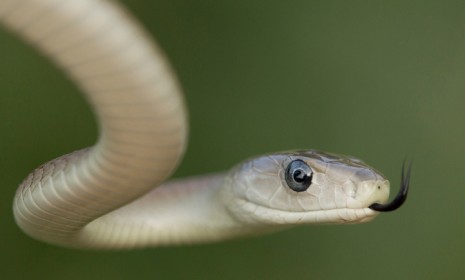Black mamba venom: A safer alternative to morphine?
The snake is widely considered one of the deadliest animals on the planet. But French scientists believe they've found a way to turn the poison into a painkiller

A free daily email with the biggest news stories of the day – and the best features from TheWeek.com
You are now subscribed
Your newsletter sign-up was successful
The black mamba is one of the deadliest animals on the planet, with a venomous bite so powerful that it's considered 100 percent fatal unless an antivenin is given within 20 minutes. It's perhaps strange, then, that a team of French researchers examined the venom's "cocktail of chemicals" for a new kind of painkiller, says Ed Yong at Discover Magazine. What they found is a potentially powerful new molecule that, as promising early results suggest, appears to be a safe alternative to morphine. Here's what you should know:
What exactly did scientists discover?
Sylvie Diochot and Anne Baron from France's Institute of Molecular and Cellular Pharmacology began their animal venom research by looking for chemicals that could block a type of protein called acid-sensing ion channels — ASICs — that help us feel pain. Whenever our cells are damaged, they release an "inflammatory soup" of chemicals, says Discover Magazine's Yong. ASICs — which are "like miniature gates" on the surface of neurons — open up and let this soup flow in, triggering pain as a warning system to tell our bodies that something is wrong. After studying the venom of 50 species, Diochot and Baron identified two proteins in mamba venom that effectively block ASICs — reducing pain.
The Week
Escape your echo chamber. Get the facts behind the news, plus analysis from multiple perspectives.

Sign up for The Week's Free Newsletters
From our morning news briefing to a weekly Good News Newsletter, get the best of The Week delivered directly to your inbox.
From our morning news briefing to a weekly Good News Newsletter, get the best of The Week delivered directly to your inbox.
How effective were the proteins at dulling pain?
Extremely effective. The team named tested the proteins — dubbed "mambalgins — on mice, and found that the ASIC-blocking snake venom was as effective as some opiates, including morphine, in dulling pain. "Pain pathways are pretty well conserved between mice and humans," says Baron, "making us confident that these peptides will also be efficient in humans."
Why are mambalgins safer than morphine?
"Morphine acts on the opioid pathway in the brain," says James Gallagher at BBC News. That means that while it can diminish severe pain, it's also extremely addictive. Side effects include "headaches, difficulty thinking, vomiting, and muscle twitching." Though it's still early, the isolated mambalgins identified in the snake's venom don't appear to have any toxic side effects.
A free daily email with the biggest news stories of the day – and the best features from TheWeek.com
What do scientists think about the breakthrough?
"It's very exciting," says Dr. Nicholas Casewell, a snake venom expert at the Liverpool School of Tropical Medicine. What we're talking about here is an "entirely new class of analgesics." Still, developing a painkiller for humans could be many, many years away. "To develop a new drug, you need 10 to 15 years [and] $1 billion," Zoltan Takacs, a herpetologist and toxicologist tells National Geographic. "And you still have no guarantees."
Sources: BBC, CBS News, Discover Magazine, National Geographic
-
 ‘States that set ambitious climate targets are already feeling the tension’
‘States that set ambitious climate targets are already feeling the tension’Instant Opinion Opinion, comment and editorials of the day
-
 Mixing up mixology: The year ahead in cocktail and bar trends
Mixing up mixology: The year ahead in cocktail and bar trendsthe week recommends It’s hojicha vs. matcha, plus a whole lot more
-
 Labor secretary’s husband barred amid assault probe
Labor secretary’s husband barred amid assault probeSpeed Read Shawn DeRemer, the husband of Labor Secretary Lori Chavez-DeRemer, has been accused of sexual assault